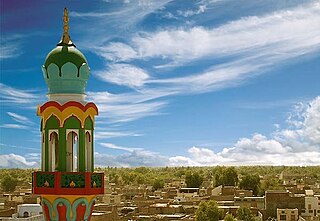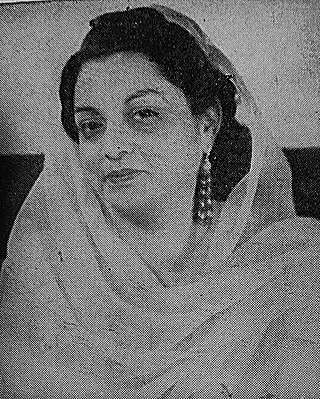Related Research Articles

Punjab is a province of Pakistan. Located in central-eastern region of the country, Punjab is the second-largest province of Pakistan by land area and the largest by population. Lahore is the capital and the largest city of the province. Other major cities include Faisalabad, Rawalpindi, Gujranwala, Sargodha, Gujrat and Sialkot, while Multan was historic capital of the region.

Faisalabad, formerly known as Lyallpur(Punjabi, Urdu: لائل پور), is the second largest city and industrial centre of the Pakistani province of Punjab. It is the third largest and populous city in Pakistan, with an estimated population of 3.7 million in 2023. It is situated in the north-east of the country, lying between the plains of the Ravi and Chenab River. Faisalabad is one of Pakistan's wealthiest and most industrialized cities, the largest industrial hub and second largest city of the wider Punjab region.

Education in Pakistan is overseen by the Federal Ministry of Education and the provincial governments, while the federal government mostly assists in curriculum development, accreditation and the financing of research and development. Article 25-A of the Constitution of Pakistan obligates the state to provide free and compulsory quality education to children of the age group 5 to 16 years. "The State shall provide free and compulsory education to all children of the age of five to sixteen years in such a manner as may be determined by law".

Layyah District, is a district in the Punjab, Pakistan. It is located in the southern part of the province. Layyah City is the district headquarter of Layyah District. Layyah has hot desert climate.

The Government of Punjab is the provincial government of the Pakistani province of Punjab. It is based in Lahore, the provincial capital. Its powers and structure are set out in the provisions of the Constitution, in which 41 districts come under its authority and jurisdiction. The government includes the cabinet, selected from members the Punjab Provincial Assembly, and the non-political civil staff within each department. The province is governed by a unicameral legislature with the head of government known as the Chief Minister. The Chief Minister, invariably the leader of a political party represented in the Assembly, selects members of the Cabinet. The Chief Minister and Cabinet are thus responsible for the functioning of government and are entitled to remain in office so long as it maintains the confidence of the elected Assembly. The head of the province is known as the Governor, appointed by the federal government, on behalf of the President, while the administrative boss of the province is Chief Secretary Punjab.

The All Pakistan Women's Association, or APWA, as it is commonly known, is a voluntary, non-profit and non-political Pakistani organisation whose fundamental aim is the promotion of moral, social and economic welfare of the women of Pakistan.

Before the arrival of European settlers, who introduced a formal education system addressed to the elites, education in Ghana was mainly informal and based on apprenticeship. Economic activities in pre-colonial Ghana were based on farm produce shared within households and members of each household specialized in providing necessities such as cooking utilities, shelter, clothing, and furniture, and trade with other households was therefore practiced on a very small scale. As such there was no need for employment outside the household that would have otherwise called for disciplines, values, and skills through a formal education system. After colonization, Ghana's economy became a hybrid of subsistence and formal economy.
Sudhaar is working for the improvement of education in several districts of Pakistan. Sudhaar has developed more than 500 Non-Formal Education Centers to provide education to the marginalized working children. Sudhaar has adopted the strategy of mainstreaming to bridge the Non-Formal and Formal Sectors. So far more than 5000 children have been mainstreamed to Government / Private Formal Schools. Sudhaar is also working to improve capacity of Education Departments in various districts as well as. Education Planning at various levels is also one of the speciality of Sudhaar. So far Sudhaar has developed more than 20 District Education Plans, 5000 School Development Plans and 20 Markaz Education Plans, to better functionality and improvement in quality education.
The UNESCO Confucius Prize for Literacy recognizes the activities of outstanding individuals, governments or governmental agencies and non-governmental organizations (NGOs) working in literacy serving rural adults and out-of-school youth, particularly women and girls. The Prize was established in 2005 through the support of the Government of the People's Republic of China in honour of the great Chinese scholar Confucius. It is part of the International Literacy Prizes, which UNESCO awards every year in recognition of excellence and inspiring experiences in the field of literacy throughout the world. The Confucius Prize offers two awards of US$20,000 each, a medal and a diploma, as well as a study visit to literacy project sites in China.
Drinking water supply and sanitation in Pakistan is characterized by some achievements and many challenges. In 2020, 68% Pakistanis, 72% Indians, 54% Bangladeshi had access to the basic sanitation facilities. Despite high population growth the country has increased the share of the population with access to an improved water source from 85% in 1990 to 92% in 2010, although this does not necessarily mean that the water from these sources is safe to drink. The share with access to improved sanitation increased from 27% to 38% during the same period, according to the Joint Monitoring Program for Water Supply and Sanitation. There has also been considerable innovation at the grass-root level, in particular concerning sanitation. The Orangi Pilot Project in Karachi and community-led total sanitation in rural areas are two examples of such innovation.
Attash Durrani was a Pakistani linguist, researcher, critic, author, educationist, and gemologist. He wrote more than 275 books and approximately 500 papers in Urdu and English. His main disciplines of study were language, education, computer science, and information technology. He was the recipient of the Tamgha-i-Imtiaz and Sitara-e-Imtiaz for his work of Urdu language and literature.
Ch Ansir Iqbal Baryar was a Member of the Provincial Assembly of the Punjab (Pakistan) (2002–2007) and Chairman of the Standing Committee on Literacy and Non-Formal Basic Education.
Child labour in Pakistan is the employment of children to work in Pakistan, which causes them mental, physical, moral and social harm. Child labour takes away the education from children. The Human Rights Commission of Pakistan estimated that in the 1990s, 11 million children were working in the country, half of whom were under age ten. In 1996, the median age for a child entering the work force was seven, down from eight in 1994. It was estimated that one quarter of the country's work force was made up of children. Child labor stands out as a significant issue in Pakistan, primarily driven by poverty. The prevalence of poverty in the country has compelled children to engage in labor, as it has become necessary for their families to meet their desired household income level, enabling them to afford basic necessities like butter and bread.

The American International School System (AISS) is a private coeducational school following an American-based curriculum. Located in Lahore, Pakistan, the school offers education from Pre-Kindergarten through Grade 8 with plans to expand through high school.
Allah Bakhsh Malik is a social scientist, public policy advisor, academic, researcher, and author with experience in management, education and institutional and human development. He served as Secretary for Education during 2017-2019. Malik was conferred UNESCO Confucius Award in 2011. He served as Secretary of Education to the Government of the Punjab and Secretary of National health Services, Pakistan. He also served as the Federal Health Secretary of Pakistan.
Higher Education Department (HED) is a department of Government of Punjab, Pakistan. Higher Education Department is responsible for education, learning and related services for students, as well as teaching and non-teaching staff, serving in public and private higher education institutions in the Punjab.
Special Education Department is a department of Government of Punjab, Pakistan. The department meets the Special education requirements of the disabled children especially, hearing impaired, visually impaired, mentally retarded and physically disabled.
School Education Department is a department of Government of Punjab, Pakistan. The functions of the department are to perform legislation, policy formulation and planning of primary, middle, secondary and higher secondary education and maintain standards of education in these fields.
Raja Rashid Hafeez is a Pakistani politician who was the Provincial Minister of Punjab for Literacy and Non Formal Basic Education, in office from 27 August 2018 till April 2022. He had been a member of the Provincial Assembly of the Punjab from August 2018 till January 2023. Previously, he was a Member of the Provincial Assembly of Punjab from 2002 to 2007 and again from May 2013 to May 2018.

Sustainable Development Goal 4 is about quality education and is among the 17 Sustainable Development Goals established by the United Nations in September 2015. The full title of SDG 4 is "Ensure inclusive and equitable quality education and promote lifelong learning opportunities for all".
References
- ↑ "Non-formal education aims to end cycle of poverty for kiln workers in Pakistan | Pakistan | UNICEF". 2016-08-30. Archived from the original on 2016-08-30. Retrieved 2022-02-28.
- ↑ "Non-Formal Education Promotion Project | Pakistan | Countries & Regions | JICA".